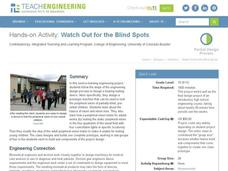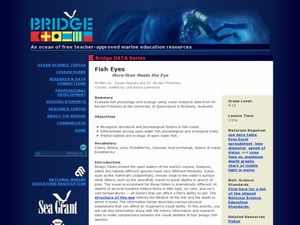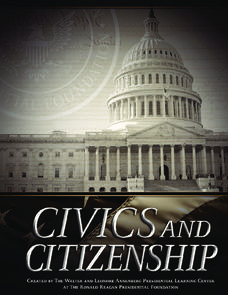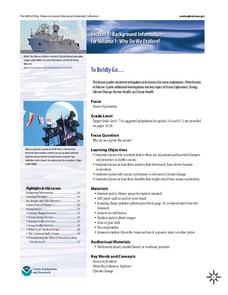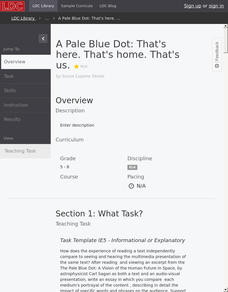Curated OER
Crazy Horses' Vision Teacher's Guide
Third graders read and discuss the story of Crazy Horse. In this Crazy Horses' Vision teacher's guide, 3rd graders examine the life of Native American, Crazy Horse. Students answer questions, perform literature circle roles, and complete...
Curated OER
Out of the Dust: Visions of Dust Bowl History Lesson Overview
Students complete activities with the book Out of the Dust by Karen Hesse. In this literature lesson plan, students read this story and view the Dust Bowl history from the eyes of a child. They discover the Great Depression and life in...
Curated OER
Word Recognition
In this recognizing words worksheet, students read, cut, glue matched pairs, and practice printing the words see, like, can, and and. Students complete activities for four words.
Curated OER
Word Recognition: the, a is, to
In this recognizing words worksheet, students read the words the, a , is, and to, cut them and glue them next to their matching word, and practice writing them. Students complete three activities.
Curated OER
Interpreting Medical Data
Young scholars explore human anatomy by graphing scientific data. In this vision lesson, students discuss how ophthalmology works and take their own eye assessment test using the Snellen chart. Young scholars collect vision data from all...
Curated OER
Challenges and Changes: Sensitivity to Vision & Hearing Compromises
Students examine the structure of the eye. In this eye anatomy lesson students complete a lab activity of the human eye.
Curated OER
Sight and Light
Young scholars examine the eyeball and its parts. In this sight lesson students divide into groups and complete a lab activity that includes creating a model.
Teach Engineering
Watch Out for the Blind Spots
Applying engineering concepts to the field of medicine, pupils design a device to help test peripheral sight. The class learns and follows a specific design process for engineers before separating into groups; each group builds a...
Curated OER
Fish Eyes - More than Meets the Eye
Inform your class about the adaptations in fish eyes: cones, lens size, endothermy, and speed of vision. The adaptations are related to diving behavior. Junior marine scientists compare the adaptations of four different fish species to...
Florida Center for Reading Research
Phonics: High-Frequency Words, Word Fishing
To practice reading high-frequency words fluently, learners play a fishing game at a learning center. They take turns fishing; each fish contains a single high-frequency word. To keep the fish they caught, they must be able to read the...
Missouri Department of Elementary
R-E-S-P-E-C-T: A Basic Skill
Imagine seventh graders developing a school wide plan to promote respect in their school. That's the vision behind the second lesson in the R-E-S-P-E-C-T series. In preparation for designing a school-wide media campaign, class members...
Missouri Department of Elementary
A Stranger Among Us
The final lesson in the R.E.S.PE.C.T series asks eighth graders to expand their vision beyond the walls of the classroom and to consider how they can promote acceptance and respect of others within in the global community. "A Stranger...
Las Cumbres Observatory
Astronaut Training: Taste
Gravity isn't the only thing astronauts lose in space. Learners investigate why astronauts complain about a loss of taste while in space in a hands-on activity. They taste test foods while limiting their other senses and rate each food...
Mathematics Vision Project
Quadratic Equations
Through a variety of physical and theoretical situations, learners are led through the development of some of the deepest concepts in high school mathematics. Complex numbers, the fundamental theorem of algebra and rational exponents...
Exploratorium
Disappearing Act
Crafty critters are camouflaged to escape predators, and crafty science pupils can construct a camouflage demonstration. They work with a partner to show that as a camouflaged animal moves, it becomes more visible.
Washington Office of Superintendent of Public Instruction
Using Our Senses to Observe
Look around and explore. Little ones use their five senses with some day-to-day activities designed to guide observation and apply STEM strategies. Young scientists learn through comparing/contrasting and observing with magnifiers as...
University of California
Roots of the Cold War
When and how did the Cold War begin? To answer this question, you will not find a better-organized, in-depth, activity- and inquiry-based resource than this! Executing best teaching practices throughout, each portion of this inquiry...
Howard Hughes Medical Institute
The Making of the Fittest: Got Lactase? The Co-evolution of Genes and Culture
Got milk? Only two cultures have had it long enough to develop the tolerance of lactose as an adult. Learn how the responsible genes evolved along with the cultures that have been consuming milk. This rich film is supplied with a few...
Australian National Schools Network
Civics and Citizenship
What is a good citizen? Here is a fantastic unit of ten lessons that will thoroughly cover the concept of civics and citizenship in your class. Examples of activities include learning stations, primary and secondary source analysis of...
NOAA
To Boldly Go...
When we think of ocean exploration, many of us have visions of sunken pirate ships full of treasure or mysterious creatures of the deep. What really motivates deep-sea investigation? The first in a series of diverse six-part lessons...
Literacy Design Collaborative
A Pale Blue Dot: That's Here. That's Home. That's Us.
21st-century learners live in such a visual world that many are unused to letting their minds imagine the picture that words create. An excerpt from Carl Sagan's lecture, "The Pale Blue Dot: A Vision of the Human Future in Space,"...
Core Knowledge Foundation
The Human Body—Systems and Senses Tell It Again!™ Read-Aloud Anthology
Nine lessons over three weeks explore the human body through read-alouds. Third graders listen to and discuss a reading followed by extension activities, including word work and comprehension practice. Learners draft a narrative essay.
Houghton Mifflin Harcourt
We’re a Family: Extra Support Lessons (Theme 3)
Pay special attention to onsets and rimes and initial consonants with this packet of activities designed to provide additional support to youngsters just learning to read and write.
Curated OER
Sight Word Journal writing
Students write an original journal of words they can read. In this sight words lesson, students draw pictures and write words they recognize in their personal journal.









